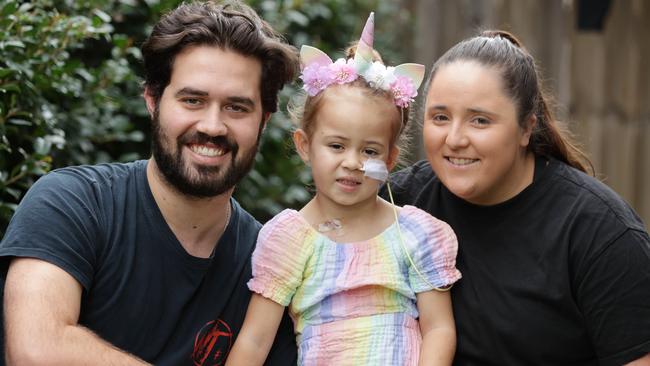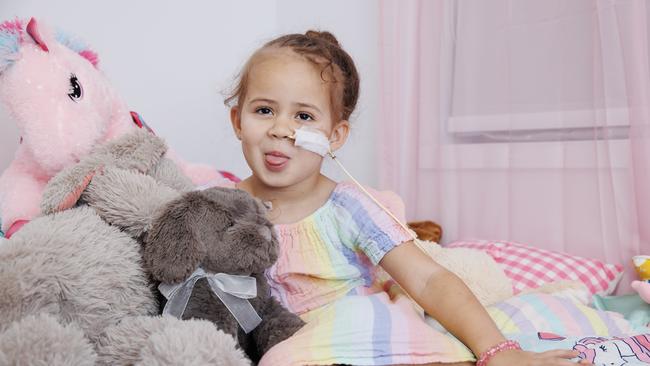Family’s shock after four-year-old diagnosis with neuroblastoma
A four-year-old Queensland girl has been diagnosed with an extremely rare cancer, her family now fighting to raise money to seek potentially lifesaving treatment in the United States.

QLD News
Don't miss out on the headlines from QLD News. Followed categories will be added to My News.
A four-year-old girl has been diagnosed with an extremely rare childhood cancer after her mum pushed for more tests after doctors initially diagnosed a virus.
Emily Borg was diagnosed with Stage 4 High-Risk Neuroblastoma at the Queensland Children’s Hospital last week.
Her mum Emma Cantrell said Emily visited doctors on multiple occasions, with the diagnosis of a virus and antibiotics prescribed.
When Emily could not put weight on her right leg, her parents were told it was most likely due to inflammation in her hip joint as a result of a viral infection.
But Ms Cantrell said her “mum instincts” kicked in and she pushed for an abdominal scan, which revealed a large mass on her right adrenal gland.
“The sonographer who broke the news could only apologise, saying, “I'm so sorry. I don’t know what to tell you, this is the hardest part of my job,” Ms Cantrell said.
“I couldn’t believe what I was hearing,” Ms Cantrell said.

An hour later, Emily was taken to the oncology ward at the Queensland Children’s Hospital where she was diagnosed with neuroblastoma, a rare childhood cancer.
“I hoped and prayed that they had got it wrong, that this was just a bad nightmare, and that at any moment we would wake up,” Ms Cantrell said.
The cancer has now reached Emily’s spine, head, legs, bones and her bone marrow.
Emily’s father Brodie Borg said they hadn’t even heard of neuroblastoma two weeks ago.
“It’s such a clichéd platitude, but you never think it will happen to you. At the start of the year, we didn’t have a child with cancer. Now, we do,” Mr Borg said.
“But, her amazing spirit gives us strength, and we’re comforted by the fact that she’s a fighter.”
Emily’s family aim to raise money for the MSK vaccine available in America with promising trials that cost between $250,000 and $500,000 and for the day-to-day living costs of caring for Emily.
Following her diagnosis last week, Emily has completed her first round of chemo, had three blood transfusions, a port-a-cath implanted in her chest for chemo, on a feeding tube, a biopsy of the primary tumour and a bone marrow aspiration.
“Her treatment plan will be long and gruelling, and we don’t know if it will work,” Ms Cantrell said.
Emily’s aunt Kate Cantrell said Neuroblastoma researchers at the Memorial Sloan Kettering Cancer Centre in New York had developed a vaccine that was designed to train the child immune’s system to identify and destroy any neuroblastoma cells that might still be lurking after chemotherapy.
“The MSK vaccine is the only paediatric tumour vaccine in the world, and it shows a lot of promise for kids like Emily,” Kate said.
The treatment is not available in Australia.
“The vaccine alone, which is given several times over the course of a year, costs approximately $450,000 AUD, this does not include the cost of travel to America or accommodation,” Kate said.
“It might be her best shot.”
The fundraiser has so far raised $42,580, just half way shy of their $100,000 goal in only six days.
“This is Emily‘s fight. It’s a big fight for a four-year-old, but we are following Emily’s lead, and we will be there to hold her and love her, every step of the way,” the GoFundMe said.
Head of the Oncology Department at the Queensland Children’s Hospital Dr Wayne Nicholls said about six per million children will get Neuroblastoma each year.
“Children are always falling over and hurting themselves so it’s understandable that she was thought to have either an injury or an inflamed hip due to a virus,” Dr Nicholls said.
“(Not finding out it was neuroblastoma) does happen but it’s because of the rarity of childhood cancer – a normal person working in primary care in their lifetime might see one patient with childhood cancer”
But Dr Nicholls said Emily had handled her treatment well.
“When I met her she was remarkably well despite having metastatic neuroblastoma – I personally think it was picked up quite quickly,” Dr Nicholls said.
A Metro North Health spokesman said they were unable to comment on individual patients but throughout the triage and admission process, patients are assessed and diagnostic tests are done if needed.
“We support families to be active participants in decisions around their loved one’s care,” they said.


